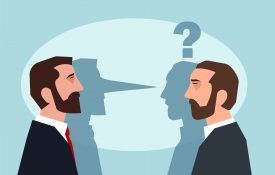-

Science Shows How Students Can Stop Sweating Statistics
A pair of psychological scientists review the state of research on statistics anxiety and outline several ways for instructors to help reduce students’ worries.
-
Your Personality Might Not be Suitable for Telework
The ferocious US winter of 2014 has undoubtedly demonstrated the economic viability of telework. In many parts of the country, home broadband connections, VPNs, and cloud-based applications allowed numerous workers to continue working when heavy snows prevented them from getting to the office. In fact, telework is becoming not only an option on snow days, but a common practice among employers across the globe. In the United States alone, telework arrangements have grown by more than 63% since 2006, according to market research company Global Workplace Analytics.
-

The Unconscious Mind Can Detect a Liar — Even When the Conscious Mind Fails
When it comes to detecting deceit, your automatic associations may be more accurate than conscious thought in pegging truth-tellers and liars, according to findings from a psychological study.
-
What’s the Value of a Dollar? It Depends on How You Perceive Numbers
When it comes to how we value money, all dollars (or Euros or yen or pesos) are not created equal. If someone gives you three dollar bills and then offers a fourth, the prospect of getting that extra dollar is kind of exciting. But if someone offers you 33 dollar bills first, the additional dollar loses some of its luster. This is because the extra dollar in the first scenario has greater subjective value than the extra dollar in the second scenario, a phenomenon economists often call “diminishing marginal utility” (DMU). If you were to poll a bunch of people and map out the subjective value of each additional dollar, the values would take a curvilinear shape.
-
How Do Social Pressures Tip Our Ethical Balancing Acts?
Scott Adams, who has endlessly satirized office culture in his comic strip Dilbert, once surmised that the most influential people in his life were probably not even aware of what they’d taught him. That lack of awareness Adams describes is rather common. Studies have demonstrated that people tend not to recognize the influence they have over others when they make a request, suggestion, or observation. You may have trouble saying no to a colleague who asks for help on a project or assignment, but you can bet that same individual would have trouble declining your requests, as well. But what happens when someone asks you to do something unethical?
-
Social Processes in Daily Life
Michael Roche and his coauthors studied social processes and how they play out in daily life. In their study, college students with a high-dependency or a low-dependency personality reported how agentic (dominant vs. submissive) and communally (friendly vs. unfriendly) they behaved towards others, and how agentic and communally others behaved towards them during a one week period. High-dependency and low-dependency participants were similarly agentic towards interaction partners that were highly communal, but high-dependency participants were much less agentic than low-dependency participants to interaction partners that were less communal.

